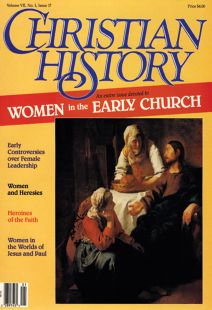From the Archives: The Acts of Thecla
[THE GOVERNOR] commanded that Paul be bound and carried off to prison until he had the opportunity to hear him more attentively.
But at night Thecla removed her bracelets and gave them to the gatekeeper, and when the door was opened for her, she went into the prison. And giving the jailer a silver mirror, she went in to Paul. She sat by his feet and heard the great deeds of God. Paul did not fear at all, but lived freely in the perfect openness of God. And her faith was increased by kissing his bonds.
As Thecla was sought by her own people and by Thamyris, as she was searched for in the streets like a lost person, one of the fellow-servants of the gatekeeper revealed that she had gone out at night. And they inquired of the gatekeeper and he told them that she had gone to the stranger in prison. They went just as he had told them and found her, bound to him in a manner of affection. And having departed from there, they drew together the crowd and showed it to the governor.
And he commanded Paul to be brought to the platform. Thecla, however, rolled around on the place where Paul had taught when he sat in prison. And the governor commanded that she also be brought to the platform. She went, exultant with joy. And the crowd, when Paul was brought in again, shouted inordinately, “He is a wizard, away with him!” But the governor gladly heard Paul on the subject of the holy deeds of Christ. And taking counsel, he called Thecla and said, “Why will you not marry Thamyris, according to the law of the Iconians?” But she just stood, gazing intently at Paul. When she did not reply, Theocleia, her mother, cried out, saying, “Burn the lawless woman, burn her who is not a bride in the middle of the theater, so that all women who have been instructed by this man may be afraid!”
The governor was greatly affected and having scourged Paul, he sent him outside the city, but Thecla he sentenced to be burned. Immediately the governor arose and went to the theater, and the entire mob went out for the distressing spectacle. But Thecla, like a lamb in the wilderness who looks about for the shepherd, sought Paul. And when she looked at the crowd, she saw the Lord sitting there, as if he were Paul, and she said, “As if I were not able to bear it, Paul came to watch me.” And gazing at him, she kept intent on him. But he went away into the heavens.
And the boys and the virgins brought wood and hay in order to burn Thecla. And as she was brought in naked, the governor wept and was astounded at the Power in her. They spread the wood and the public executioners ordered her to climb on the pyre. She made the sign of the cross, went up on the wood, and they lighted it. A great flame blazed but the fire did not touch her. For God, showing compassion, produced a noise under the ground and a cloud threw a shadow from above, full of rain and hail, and the whole vessel was poured out so that many were endangered and died, and the fire being extinguished, Thecla was saved.
By the Editors
[Christian History originally published this article in Christian History Issue #17 in 1988]
Next articles
From the Archives: The Value of Virginity
Excerpt from an early church document elevates virginity.
the EditorsFrom the Archives: Agnes: the Virgin Martyr
From the bitter persecution of Diocletian (303–305), a young heroine emerged.
PrudentiusEarly Church Women and Heresy
Of course not only women were attracted to the heretical sects that diverged from early church orthodoxy, but women were prominent in their leadership and teachings. Why might this have been?
Ruth A. Tucker and Walter LiefeldPaula: A Portrait of 4th Century Piety
This close friend of the scholar Jerome, known for her scholarship and her extreme piety and generosity, was one of the most noteworthy people—women or men—in all the 4th-century church.
Nancy A. Hardesty



